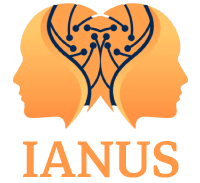As part of IANUS’ mission to foster warranted trust in science, RU (in collaboration with Bioart Laboratories ) held a firepit debate during the Dutch Design Week, an international design festival taking place yearly in Eindhoven, the Netherlands. Hosted at the Bioart Laboratories art centre, RU researchers conversed with the visitors of the Dutch Design Week and discussed some provocative statements about trust in science with the general public in a relaxed atmosphere to inspire further thoughts and incite reflections. This was part of IANUS’ co-creative approach and its overall goal was to unveil what citizens think about the trustworthiness of science and what concerns should be acknowledged by the scientific community.
The debate was kick-started by Laurens Landeweerd, from Radboud University, who briefly introduced the IANUS project and Radboud’s specific focus on climate and sustainability. The debate statements were read out loud by the moderator (Laurens) and participants were instructed to move to the left or the right side of the room depending on whether they agreed or disagreed with the discussed statement. Interestingly, people also lingered in the space in between the two sides, demonstrating their doubts. The moderator would then ask participants from both sides to clarify their positions. The debate statements were designed to highlight several cases where science meets social action. More specifically, we probed perceptions of trustworthiness in cases of a) scientific activism b) policy advisory and c) collaborations with industry.
The group of participants included several natural scientists with a good understanding of the dilemmas of private-public partnerships, while other visitors were likely to have an interest in sustainable development, which may explain attentiveness to the larger systemic issues surrounding climate change mitigation.
This exercise offered an exploratory look into the views of a given group at a given moment in time. To some extent, what the participants choose to discuss is equally relevant as what the organizers wished to enquire about. The prevailing attitude of the participants towards scientists was favorable, with science being attributed a capacity to contribute to better governance and a better environment. However, participants also pointed to the limits of scientific expertise and called for a less technological approach when dealing with the present ecological crisis.
In terms of public trust, scientists seemed to enjoy a high level of trust with participants being predominantly skeptical about external influences. The negative impact of the industry (and, occasionally, of political actors) was reaffirmed as a reason for warranted distrust. Participants demanded that scientists behave ethically (as in both resisting the pressures of the industry and considering the implications of their research) but little was said about scientists taking a more proactive role in societal emergencies.
Considering the relation between interestedness (in its many forms) and trustworthiness, the findings emerging from this study were somewhat mixed. Throughout the debate, the value-related influences discussed by the participants tended to fall under two categories. On the one hand, several examples pointed to an “after -the- fact” corruption: the science is good (reliable, solid) but what happens with it afterwards is a reason for distrust. On the other hand, participants also understood that personal values or external interests affect research already in its conception, e.g., by framing the research question and /or the solution space. And while participants seemed to accept that all science is political, they also described science as the closest we can get to an objective truth.
Such inconsistencies are, of course, excused given that the various arguments were provided by randomly selected participants throughout the debate; each participant was likely to hold an internally consistent view about science. Still, this variation may also suggest that citizens have a complex understanding of the reality of scientific life and struggle to reconcile these equally valid aspects of the social context of scientific practice.
